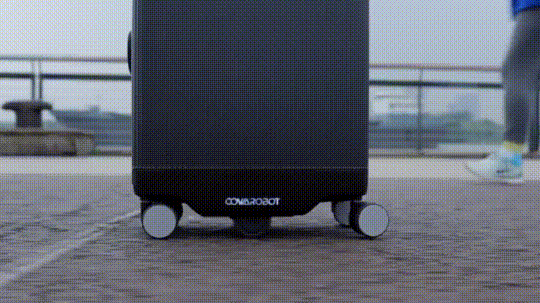It was not so long ago that the suitcase was revolutionized by wheels. That patent was granted in 1972; the famous flight attendant staple the Rollaboard was introduced in 1987. Nowadays, everybody rolls, and it’s hard to imagine a suitcase that could be more convenient. Except that soon, there will be.
Over the past few years, there has been a feverish push for the next innovation in airport luggage: the bag that rolls all on its own.
The robot suitcase could become the first widely adopted personal robot
I first became aware of the robotic suitcase phenomenon in May, when it was a mega-hit at CES Asia, the consumer electronics show in Shanghai. There, COWAROBOT stole the show with a 10-pound suitcase, funded via Indiegogo, that zooms alongside its owner at a reported 4.5 miles per hour.
The robo-case was pretty buggy, according to reporters, and the company blew the September ship date it was promising at the time. COWA now says the $699 luggage will ship in the first quarter of 2017. It had better hurry, because there are many competitors on its heels. While they are still idling just outside the consumer market, the robot suitcase could become the first widely adopted personal robot: a useful tool that the state of technology suggests should be achievable without bugginess, with enough of a gee-whiz factor to justify the price.
Travelmate, another Indiegogo-funded project, is promising to ship its self-rolling models for $399 (small), $495 (medium), and $595 (large) in June 2017. Crowdfunded projects tend to miss deadlines, especially when they are promising hardware, so that one likely won’t be out this summer.
Olive, a self-rolling suitcase that can also be ridden like a Segway, is from Iran-based IKAP Robotics. Olive, which has no publicly announced ship date, took first place in a personal robotics competition in Munich last year and is reportedly seeking financing in order to start manufacturing.
This model may also be pricier, since it’s a lot more ambitious: Olive will reportedly remind its owner to hurry if the flight is about to board, can weigh itself in order to test whether it will be over the airline’s limit, and can charge phones and laptops.
Nua Robotics, based in Israel, showed Mashable a prototype in January 2016, which the reporter described as “very much in a testing phase.” At the time, the company’s founder estimated models would be out in a year — in other words, now. There is still no price, no public ship date, and no recent press; the latest, from July, says the company was raising its seed round. In an email, the company said, "Unfortunately, we don't have a final launch date yet but we are working to make it happen ASAP."
If you’re wondering where your promised robot suitcase is, there may be more news this week. The flagship CES event takes place in Las Vegas starting Jan. 5, and robotic suitcase frontrunner COWA will be there. The company’s reps did not immediately respond to an email, which is odd since they should be traveling hands-free on their way from China.
CES will also feature this:
